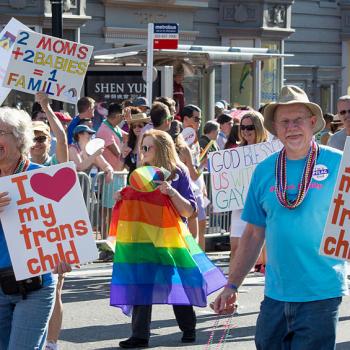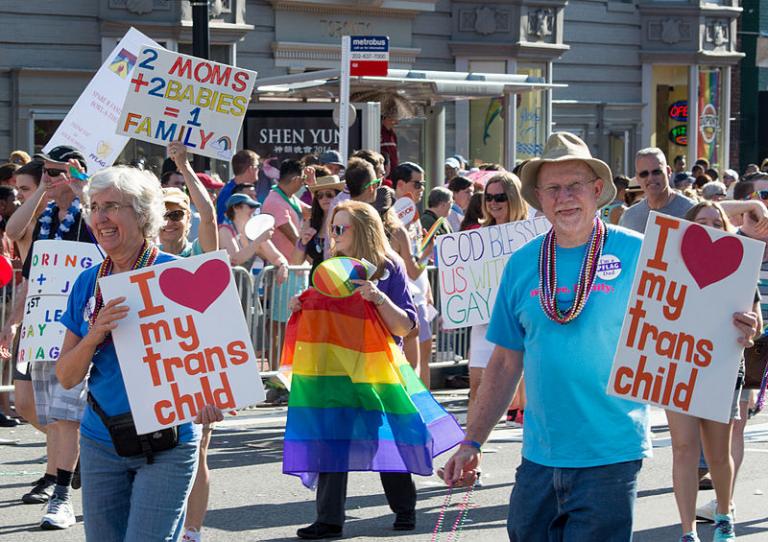No surprise, I guess, but a Slate author, Chase Strangio, went further than I’ve yet seen towards making the assertion that whether one is male or female has only to do with how one identifies, and nothing at all to do with one’s physiology.
Most insidious, we use the same language that opponents of transgender people use, carelessly referring to women who are trans as having “male genitals” or being “born with a male body” or being “anatomically male.” This language is both factually wrong and dangerous.
There is plainly no one type of body that we could accurately label a “male body.”
At birth, we classify infants as male or female based solely on the appearance of their external genitalia. Notably, this classification serves population control and surveillance and not medical purposes. The medical experts I have spoken with could not identify a single medical purpose for assigning sex at birth and explain that the components of sex are far more complex than just external genitalia and include, at least, chromosomes, genes, hormones, internal genitalia, gender identity, and secondary sex characteristics. By embracing a narrative that one is born with a “male body,” we reinforce the idea that only the bodies we assign male at birth— bodies that have medically normative penises— are male.
But that simply isn’t true. It is a choice to refer to some bodies as male and some bodies as female, not a fact. Our genital characteristics are one component of who we are and do not define, medically or biologically, our sex. . . .
I was assigned female at birth, but I have never had a female body. If it takes longer to convince the world of that than it would to simply say that I was born with a female body but am now male, I am invested in that longer path, because ultimately we will all be better off when we can challenge the idea that our body parts define us.
As usual, Strangio then takes the small percentage of the population born intersex to make a generalized, universal, claim — that because there are exceptions to this general rule, the rule itself doesn’t exist. (What next? There’s no such thing as “rich” and “poor” because some people are middle class and fit in neither category?)
The very notion that classifying people as “male” or “female” is about “population control and surveillance” is bizarre. It is of medical significance to treat individuals with the capacity for getting pregnant differently from those with the capacity for impregnating others — and fairly foolish to abandon a word that is descriptive of this difference. Even in childhood, it is relevant to note whether a child is “male” or “female” as development is monitored. In other areas of life (among them, competitive sports), it is important to distinguish between individuals of a chromosomal type that means their adult bodies are, in general, significantly larger and more muscular, vs. smaller and less muscular. Why would we abandon the use of the words “male” and “female” to describe these categories of people?
What Strangio is proposing simply, to define “female body” as “the body of someone who, at that point in time, identifies as female,” doesn’t just defy common sense; it renders the words without meaning. The word Orwellian is overused, but, if anything fits that label, this is it. And Strangio’s side is, right now, winning the political battle.
Clarification: I’ve written on transgender issues before. Except for a small minority, humans can be classified as “male” or “female” by their chromosomes and physiology; the remaining small percentage are legitimately indeterminate and intersex. Commenters claiming that my statment means that a woman with a masectomy or a hysterectomy is no longer a woman are deliberately missing the point. I’ve said in other posts that I recognize that for most advocates of “identity” as the determinant, they believe that identity is shaped in a real way by one’s brain, so this is just as real and “physiological” as anything else. What’s more, the recognition of an individual who has undergone a hormone regimen and the relevant cosmetic surgery, as having “changed sex,” is a legal construct, not a “true fact.”
All this aside, transgender advocates are taking things to a wholly new level in denying that “male” or “female” has anything to do with physiology.
UPDATE: Here’s another article, from Buzzfeed. A transgender individual, identifying as a woman but without any of the relevant surgery, called up a salon for a Brazilian wax, then filed a complaint when the tech refused to do the job, seeing as how the salon only provided genital waxing services for women, and considered the male anatomy to require training their techs didn’t have.
Karen Parker, a researcher at La Trobe University, booked a Brazilian wax at Brazilica, in Brunswick, as a birthday present to herself in October last year.
However, when the waxer saw Parker had not had sex reassignment surgery, she immediately said it wasn’t possible.
“She said ‘Let’s get started’, I took the towel off, she looked at me in horror,” Parker told BuzzFeed News. “I felt really humiliated.”











